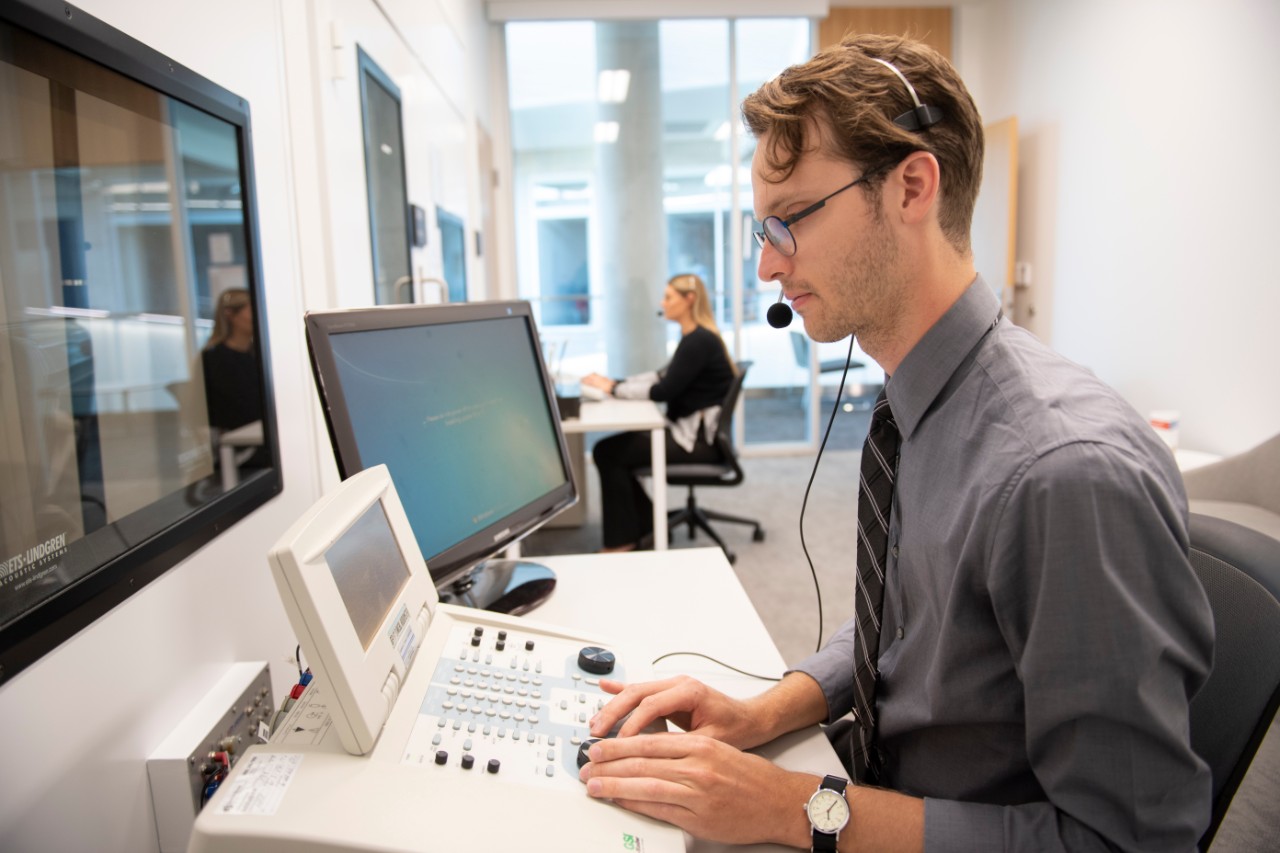
Doctor of Audiology program saves students money by taking two semesters off the curriculum
The new three-year program structure is helps students graduate & earn a professional income faster.
Student loan debt can be a major deterrent for those wanting to pursue a graduate degree. To help ease this financial burden, the UC College of Allied Health Sciences is restructuring its Doctor of Audiology program into an accelerated three-year program. By shaving two semesters off the curriculum, students can graduate faster and save money in the process. This move also sets UC apart from other universities, as CAHS will be one of the select few colleges in the country to offer this three-year Doctor of Audiology program model.
Even though the program is being condensed from 11 semesters to nine, the curriculum won’t be compromised. “Students are still getting the same coursework and meeting the same clinical competencies, but by decreasing the duration, we can help decrease their debt, and that really was a big driving force for us,” says Audiology Program Director and Assistant Professor Katie Russell, AuD, CCC-A.
We are reconfiguring the program so we can make the best use of our students’ time and help them graduate sooner and earn a professional income.
Katie Russell Audiology Program Director
The first student cohort will enter the new program format next summer. The college intentionally chose a summer program start so that students can enter their final externship year on the typical national cycle that the majority of clinical sites observe, Russell says.
In addition to restructuring the program’s duration, the college is also tweaking the curriculum to better serve students. Two years ago, CAHS conducted a review to learn how its audiology program stacked up against peer institutions with higher-ranked programs and those featuring a three-year model. After an extensive internal examination and surveying faculty, students, and community members, Russell and her team identified specific ways to improve the program’s learning objectives, including adding courses to address topics the program wasn’t adequately covering.
“We found that nationally—not just within our program—students aren’t coming in with the critical thinking skills that are required for an advanced degree, so we have added a Foundations of Clinical Practice course that will cover professionalism, clinical reasoning, ethics and other clinical topics,” Russell says. “Some of our courses were touching upon those topics in other avenues, but we didn’t have a designated course specifically dedicated to those topics. This is just one example of a curriculum change we are making.”
Russell is hopeful the new three-year format will make the program more attractive to prospective students. The college’s prime location is an added bonus, she says.
“Because we are in an urban setting, we have access to top-notch clinical sites for our students to rotate through while they are in our program, which is definitely an asset to our program. We have a broad range of opportunities for students to get hands-on clinical experience.” Now, that valuable hands-on experience will just cost students a little less.
Featured image: Photo/Colleen Kelley, UC Creative Services
The University of Cincinnati is the region's destination for thinking, making, doing, discovery and delivery. Next Lives Here.
Learn more about the Doctor of Audiology program at the College of Allied Health Sciences.
Related Stories
PHOTOS: 2025 DAAP Fashion Show
May 9, 2025
Over 900 people attended DAAPFASH25, a fashion show that highlights the collections of the fashion design Class of 2025. The show is now in its 72nd year.
UC lab-on-a-chip devices take public health into home
May 8, 2025
University of Cincinnati engineers created a new device to help doctors diagnose depression and anxiety. The “lab-on-a-chip” device measures the stress hormone cortisol from a patient’s saliva. Knowing if a patient has elevated stress hormones can provide useful diagnostic information even if patients do not report feelings of anxiety, stress or depression in a standard mental health questionnaire.
UC engineering camps leave lasting impact
May 8, 2025
Every summer, hundreds of local and out-of-state high school students come to the University of Cincinnati for immersive, enriching, engineering experiences through various summer camps. Hosted by the Office of Professional Development and Community Impact at the College of Engineering and Applied Science, these camps not only ignite students’ passion for STEM, but also introduce them to life on a college campus.